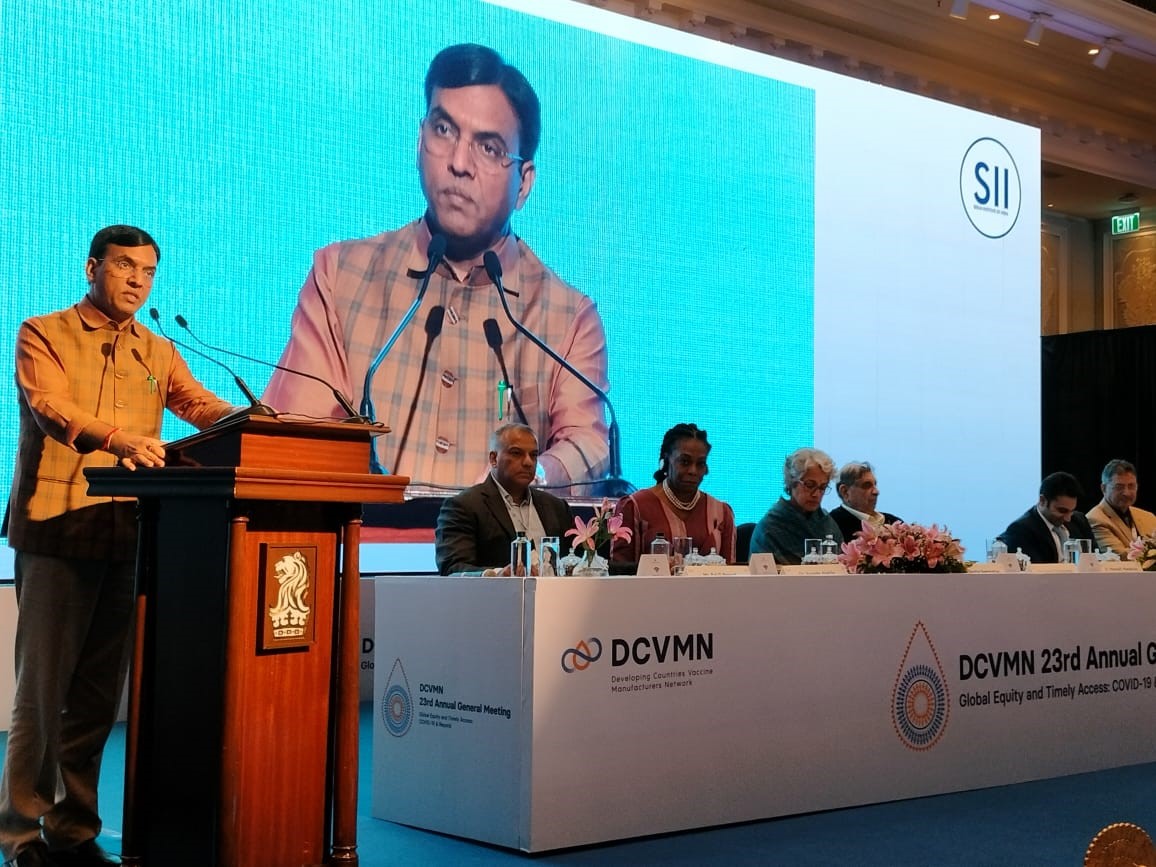New Delhi : Union Health and Family Welfare Minister Dr. Mansukh Mandaviya appealed to the governments around the world, funding agencies working on global health issues and industries to come together and ensure that the lessons learnt during the COVID-19 pandemic are studied and to then prepare a strategy for the world to succeed better in handling such crises in the future. The Union Minister was speaking at the inaugural ceremony of the Developing Countries Vaccine Manufacturers Network (DCVMN)’s 23rd Annual General Meeting in Pune today. When the power of government, scientists and industries are combined with national and international organizations, then all health challenges can be faced and resolved, he further added.
The two-day event is being co-hosted by Serum Institute of India (SII) along with DCVMN on the theme ‘Global Equity and Timely-Access: COVID-19 and Beyond’. Vaccine manufacturers, scientists, experts and industry leaders participated in today’s inaugural session.
Speaking on the occasion, the Union Minister said that this event is special as it has been organized just prior to Deepavali – a festival which every Indian regards for ‘ending darkness and moving towards light’. “I hope the darkness that was created by COVID-19 will be removed this Deepavali and an atmosphere of positivity will be created in the world”. Dr. Mandaviya said that we witnessed the importance of knowledge and wisdom when COVID-19 had spread across the world and scientists world over came together and succeeded in finding a solution for it. The Health Minister congratulated the Indian scientists who worked together with developed countries and became successful in developing vaccines for COVID-19. He said that India could become triumphant in developing ‘Swadeshi Vaccines’ because of the scientists’ hard-work and PM Narendra Modi’s faith in the country’s scientific community.
India’s COVID-19 Vaccination Experience
Speaking about India’s COVID-19 vaccination drive, the Union Health Minister asserted that 70 percent population of the country is fully vaccinated against COVID-19 today. He said that under the leadership of PM Narendra Modi, India could launch the biggest vaccination drive ‘Sabko Vaccine, Muft Vaccine’. He added that India could attain the pride of achieving 100 crore vaccinations within a short period of nine months and had administered 200 crore vaccinations in 18 months. “India could achieve success in the vaccination drive because of Hon’ble PM’s able leadership, scientific community’s wisdom, vaccinators’ hard-work and the indomitable spirit of the vaccine manufacturing companies”. Serum Institute of India, Bharat Biotech, Biological E and Zydus Cadila are the companies which assisted the Government of India at all stages of the vaccination program, said Dr. Mandaviya.
The Union Health and Family Welfare Minister said that bringing out vaccine is a great scientific achievement in the fight against diseases. It is the most cost-effective public health tool for preventing diseases across all countries, he added. “I feel happy as the vaccination coverage has increased across the world and lakhs of lives are saved as its result”. He also said that India has also continuously increased its vaccination coverage. The country’s ‘Universal Immunization Program’ stands as an evidence for it, said Dr. Mandaviya. The country has also worked for improving the scope of health-care delivery at primary, secondary and tertiary levels, he also said. “We have a strong workforce in the healthcare sector, which includes ASHA Workers. Thus, healthcare services reach out even to the last citizen in the country”.
Progress in Vaccination
The Union Health and Family Welfare Minister stated the four areas to focus on for making progress in vaccination.
Knowledge, which calls for active collaboration between industry and academia. “There is further scope for research and development in vaccine-related studies in India, which we have undertaken. Indian Universities are collaborating with foreign countries for research work”, he said
Technology, to bring the world’s best technologies to India. “Technology-transfer also needs our focus. Covishield is the best example for it, where Oxford and Astra Zeneca transferred their technology to the Serum Institute of India and mass scale production of the vaccine became possible”, said Dr. Mandaviya
Social, by which the country is focusing on developing affordable and quality vaccines. It calls for easy access to supply of raw materials, high-standards and processes and appropriate systems for quality control, explained the Minister.
Economy, by which cost of production will go down on increasing scale of production. “By following this, Indian medicines will reach out to the entire world and serve mankind everywhere”, said Dr. Mandaviya.
Normalization of ‘routine immunization’
Dr. Mandaviya called for normalization of ‘routine immunization’ which he said has “suffered a lot during the pandemic”. He said that faster progress needs to be made in this area.

The Minister acknowledged that the DCVMN is supplying about 70 percent of API vaccines in the world. “DCVMN has also focused on vaccines for Rotavirus, Japanese Encaphalitis, Pneumonia, Meningitis and Neglected Tropical Diseases. This organization’s formation is a great example of partnership model, where orgainzations like WHO, UNICEF, Bill and Melinda Gates Foundation, Donor Governments, Programme for Appropriate Technology in Health (PATH), country-level regulatory bodies and agencies and various governments played vital roles”, said the Union Health and Family Welfare Minister.
Dr. Mandaviya also assured the DCVMN stakeholders that the G-20 presided by India will take meaningful and result-oriented steps in the future too.

WHO Chief Scientist Dr. Soumya Swaminathan, Serum Institute of India’s MD Cyrus S. Poonawalla and CEO Adar Poonawalla, Bharat Biotech Pvt. Ltd.’s Sai D. Prasad were present on the occasion, while WHO Director-General Dr. Tedros Adhanom Ghebreyesus, CEPI’s Dr. Richard Hatchett, Director of the Pan American Health Organization (PAHO) and Regional Director of the WHO in the Americas Dr. Carissa F. Etienne and the President and CEO of PATH (Program for Appropriate Technology in Health) Nikolaj Gilbert joined the session virtually.
To know more about DCVMN, go to http://www.dcvmn.org/

Comments are closed.